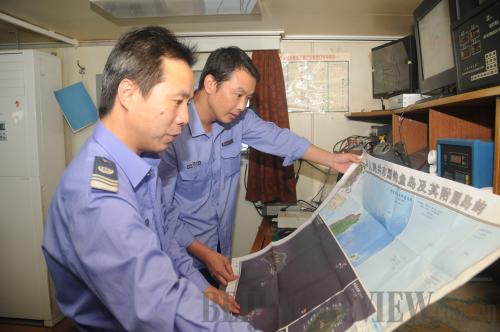|
 |
|
VIGILANCE: Chinese fishery officials look at a map of the Diaoyu Islands aboard a patrol ship in waters off the islands on October 22 (YANG JINZHI) |
China continues to fight for its sovereignty and territorial integrity through words and actions. The country's marine surveillance fleet has expelled a number of Japanese vessels sailing illegally in waters around the Diaoyu Islands while maintaining routine patrols in the East China Sea.
Four China Marine Surveillance ships spotted Japanese Coast Guard ships and other vessels on October 29, and informed them of the Chinese Government's stance on the Diaoyu Islands. The Japanese ships were told to immediately leave China's territory. The fleet also monitored the ships to collect evidence of infringement on China's sovereignty. Since mid-September, China has conducted routine patrols over the waters around the Diaoyu Islands.
At the same time, the Chinese Foreign Ministry has clarified China's stance on the Diaoyu Islands on numerous occasions. Chinese observers stressed that both sides should make more effort to repair weakened bilateral relations before more harm can been done.
A solid stance
China's position on the issue has been consistent and clear-cut. Any form of "island purchase" by Japan is illegal and invalid, and is firmly opposed by China.
On October 26, Vice Foreign Minister Zhang Zhijun gave a briefing to Chinese and foreign news organizations. He stated China's position on the Diaoyu Islands issue, urging Japan to return to peaceful negotiations. China pursues a policy of friendship and partnership with its neighboring countries and stays committed to a path of peaceful development, said Zhang. "However," he added, "should anyone try to challenge China's bottom line on the issue of sovereignty, we will have no alternative but to respond forcefully so as to remove disturbance and obstacles and move steadily on the path of peaceful development."
Liu Jiangyong, a professor of international relations with Tsinghua University, believed that Zhang's briefing illustrated to Japan and the world that China will not concede on the Diaoyu Islands issue.
"No bit of land, water and vegetation on the Diaoyu Islands can be traded away," said Zhang, condemning Japan's recent "purchase" of the islands. Zhang said that Japan has no right to buy or sell Chinese territory in any way and that no transaction is allowed over any part of the Diaoyu Islands. Japan's "purchase" is a grave violation of China's territorial sovereignty.
The Diaoyu Islands had not been an issue and their sovereignty had never been questioned until Japan illegally seized and occupied them in 1895, initiating the ongoing dispute. The islands are China's inherent territory both historically and legally. The two sides reached an understanding and common ground on leaving the issue to later resolution while normalizing relations in 1972. The Japanese Government's decision to "purchase" the islands in spite of China's firm opposition is a gross violation of China's territorial sovereignty and has had the most severe impact on China-Japan relations since the relations' normalization 40 years ago, said Zhang.
"No external threat or pressure could weaken, not even in the slightest way, the resolve of the Chinese Government and people to uphold China's territorial sovereignty," stressed Zhang.
Japan recently called off a planned island retaking drill with the United States that was scheduled for November 5. The drill was supposed to take place on Irisuna Island in southwestern Japan and would have played out a scenario involving the retaking of a territory occupied by foreign forces. Analysts believed that the cancellation was intended to avoid rising tensions with China.
| 